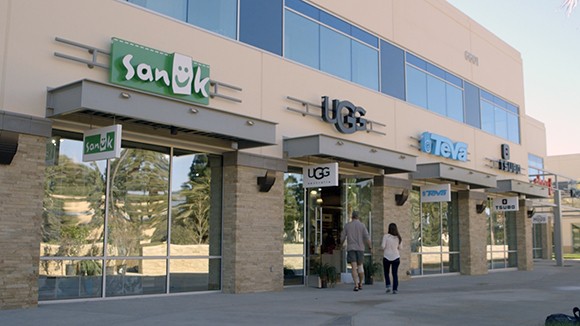Deckers’ global push takes toll on stock price
IN THIS ARTICLE
- Banking & Finance Topic
- Marlize van Romburgh Author
By Marlize van Romburgh Friday, March 7th, 2014

Deckers Outdoor Corp. has opened retail stores for its footwear brands at its new campus headquarters in Goleta. The Ugg boot parent’s stock spiraled on Feb. 28, after the company predicted a first-quarter loss stemming from costs to build out company-owned Ugg stores around the world. (courtesy photo)
Deckers Outdoor Corp. says it’s taking the long-run view when it comes to Ugg, its signature footwear brand. But investors sent the Goleta-based firm’s share price tumbling down double digits on Feb. 27-28 after Deckers predicted an unexpected first-quarter loss.
Deckers warned investors to expect a loss of 16 cents per share — compared to the 10-cent-per-share profit expected by Wall Street analysts — in the first quarter despite projected revenue growth. The company said that the reason was its aggressive build-out of its own branded retail stores around the world.
Since launching the effort in 2012, Deckers has built out 113 company-owned Ugg retail stores worldwide. The outlets aim to cut out wholesalers and let Deckers build a better relationship directly with consumers, which it says is the key to capturing lifelong Ugg fans.
“The expansion of our retail footprint is a key component of our direct-to-consumer strategy,” Linda Pazin, Deckers’ vice-president of investor relations and communications, told the Business Times in an email. “We’re putting the consumer at the center of everything we do. As early adopters of an omni-channel strategy, we are continuing to develop the critical capabilities to be able to connect with a wide range of consumers no matter which channel or device they choose to engage with us, where or when.”
Deckers plans to open about 25 company-owned stores this year, she said, in the U.S., Asia and Europe. The firm’s direct-to-consumer revenue, which includes worldwide retail store sales and worldwide e-commerce sales, increased 19 percent in the fourth quarter.
Cutting out distributors also gives Deckers a better handle on pricing and inventory, two areas that have posed problems for the firm in recent years. For example, when Deckers raised the retail price of its classic Ugg boot to $210 in response to higher sheepskin prices, retailers balked.
Deckers CEO Angel Martinez, a footwear industry veteran who previously helped to build out British running-shoe brand Reebok in the U.S., has indicated in the past that he’s interested in creating a global fashion franchise focused on the long-term — not reacting to the quarter-by-quarter whims of Wall Street.
But investors punished the company for its weak first-quarter outlook on Feb. 27, sending the shares sliding down almost 14 percent to the $73 range in after-hours trading. The shares closed at $75.01 on March 5 as the Business Times went to press, down from $84.67 before the gloomy outlook was released.
Sam Poser, an analyst with Sterne, Agee & Leach in New York, said many investors bought into Deckers hoping to ride the stock through the holiday season, which is part of Deckers’ strongest quarter. “I think a lot of fast-money bought into the quarter, including myself,” he said.
Poser noted that Deckers has a history of offering weak guidance that it goes on to surpass.
Even so, Deckers will likely have large expenses in the first quarter, he said, as it ramps up costs associated with its global store build-out. Those expenses will likely pay off in the long-run, said Poser, who maintains a “buy” rating and a price target of $95 on the stock. “Long term, I believe they are on the right track,” he said. “I would have downgraded the stock if I didn’t think that.”
Deckers said a significant amount of its operating expenses are fixed and spread evenly on an absolute-dollar basis throughout each quarter. “This includes the costs associated with the 28 new stores that were not open until the second half of 2013,” the company said in an earnings release. “Therefore, we expect our earnings to decline in the first half of 2014 as compared to the first half of 2013, which are typically our lowest volume sales quarters, and increase over 2013 in the back half of the calendar year.”
In the U.S., Deckers has plopped down Ugg stores in major markets such as New York and Chicago. But the real potential for the branded outlets, according to Poser, is in Asia. Department stores there are “like lots of little stores in a big store. There’s an Ugg store inside a big store, and they run it. It’s a very different kind of retail and it fits with what they’re doing.”
Record revenue
Deckers said profits for the fourth quarter were up 45.8 percent to a record $4.04 per share. Full-year profits for 2013 were up 21.2 percent to $4.18 per share. Both figures beat Wall Street expectations, where a survey of 18 analysts expected $3.80 per share for the fourth quarter and $3.94 for the full year, according to data compiled by Thomson Financial Network.
Deckers’ revenue for 2014 reached a record $1.5 billion. The company reported strong sales growth in its non-flagship brands and its direct-to-consumer sales through its retail stores and e-commerce efforts. But the bulk of sales remain from the Ugg brand, which were $1.3 billion. Teva and Sanuk brought in $116.4 million and $101.7 million, respectively.
Deckers’ new retail-focused business model comes as it establishes itself in a new flagship campus in the Cabrillo Business Park in Goleta. The company moved its 400 corporate employees from an aging facility near the Santa Barbara Airport into the new 150,000-square-foot headquarters at the start of the year. It is opening a corporate retail store for all of its brands, including Ugg, Teva and Sanuk, at the campus later this month.
Fiscal year shift
Deckers also said that its board of directors had authorized to shift the end of its fiscal year from Dec. 31 to March 31. Because the bulk of the company’s sales come during the holiday season, Deckers is often in the position of forecasting its revenue for the next year before it is finished tallying up sales from its most important quarter.
“It’s really straightforward,” Pazin said in her email. “Based on the seasonality of our business and timing of the fall pre-book process the board has approved a change to our fiscal year end from Dec. 31 to March 31. The change will also allow us to incorporate the learnings from the holiday season in terms of what did and didn’t work from a product, marketing and channel perspective into the following year’s plans.”
[wikichart align=”center” ticker=”DECK” showannotations=”true” livequote=”true” rollingdate=”6 months” width=”580″ height=”300″]











